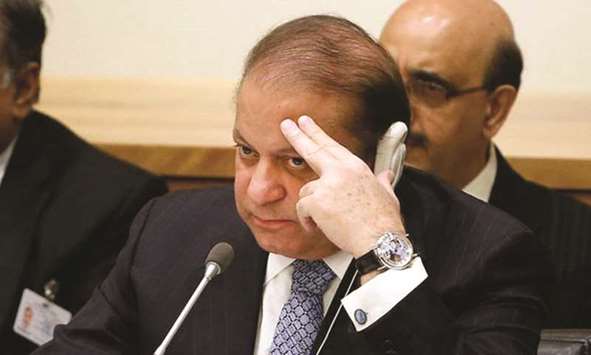When Pakistan’s former prime minister Nawaz Sharif addressed a seminar in the capital Islamabad this week, broadcasters livestreamed his speech as they do with all leaders.
It ran to script until he started to speak about his removal from office by the Supreme Court last year, a topic that promised criticism of the military and the judiciary.
Half the broadcasters abruptly ended their coverage and the rest muted Sharif’s voice to block his remarks against the country’s generals and judges.
It marked the first such collective surrender by otherwise dynamic media.
“It was a worse kind of censorship and has no justification,” said Waheed Murad, a journalist who works for a private television channel and runs his own blog.
“It looks like the army and the judiciary together want to control the media in the run-up to elections scheduled this summer,” said Murad, whose writing has been considered critical of the military.
The journalist decried the recent ban on Geo, the country’s most viewed television channel, for giving airtime to Sharif, seen as strongest of voices against the military’s alleged engineering of Pakistan’s politics.
Sharif was removed as prime minister by the Supreme Court in July last year on corruption allegations that also involved his children.
The same court later removed him as head of his Pakistan Muslim League party before this month banning him from politics for life.
Analysts say that the former prime minister may have been the target of collusion between the generals and judges due to his demand for a civilian supremacy in a country ruled by the army for almost half of its history.
Sharif has remained the country’s most popular politician and pulled tens of thousands of supporters at political rallies, where he has criticised his ouster and the army for “engineering” politics.
A provincial court this week ordered the media regulator to block speeches by Sharif and his party leaders, including successor Shahid Khaqan Abbasi.
The court said that the move was to pre-empt the criticism of “national institutions”, a term used for the army and the judiciary.
The order was criticised by television commentators and experts as a violation of the constitution, which guarantees freedom of speech to every individual.
Prominent journalist Kamran Khan, who works for Dunya television, said that the order violates basic human rights.
“I wonder how can a court issue such a verdict?” Khan asked. “This demonstrates that Sharif and his party are being singled out.”
The unannounced blockade of Geo television started after alleged coercion by agents of the army’s spy agency against distributors, according to two cable operators in the city of Rawalpindi.
“They threatened us to suspend Geo or face consequences,” one cable operator who spoke anonymously said in reference to the agents of the Inter Services Intelligence (ISI), which is often blamed for coercion and intimidation.
Cable operators run a countrywide network of distribution.
The move comes amid reports the powerful military is seeking to silence criticism of its alleged influence on Pakistan’s politics.
“Our broadcast was interrupted... in most areas,” the Geo network’s president Imran Aslam said, adding that “it is like economic strangulation”.
The cable operators have now started restoring Geo, but a journalist with the channel said that the military allowed it back on air only after a deal.
“We are back but not our sting, which should be the hallmark of a media house,” said the journalist, who requested anonymity.
It is not first time media is being muzzled in Pakistan, said Imtiaz Alam, official of South Asia Free Media Association, a regional body that works for freedom of expression.
Former military ruler Ayub Khan purged independent newspapers with laws that attracted international criticism in the 1960s.
Another general, Ziaul Haq, tried to impose Islamisation on media by forcing female anchors to wear headscarves in the 1980s, Alam said.
More recently, General Pervez Musharraf took television channels off-air for criticising the military.
In 2007, a mob supporting Musharraf fired bullets at journalists from the private Aaj Television channel, which criticised the general for removing the country’s top judge.
Journalist Murad sees more coercion as the election draws near: “It seems there will be more troubles in the future.”

Nawaz Sharif: remains the country’s most popular politician.
